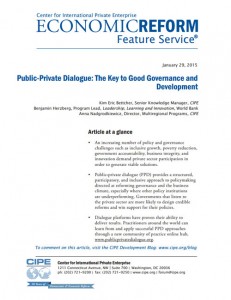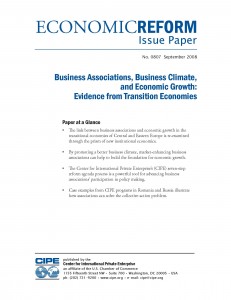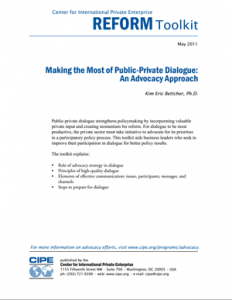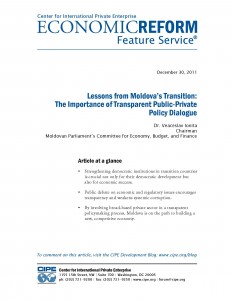Public-Private Dialogue: The Key to Good Governance and Development

An increasing number of policy and governance challenges around the world demand private sector participation in order to generate viable solutions. Such challenges include inclusive growth, poverty reduction, government accountability, business integrity, national competitiveness, innovation, and access to opportunity. A top recommendation to emerge from the 4th High Level Forum on Aid Effectiveness in Busan, Korea, was to embrace “inclusive dialogue for building a policy environment conducive to sustainable development.” Subsequently, the Global Partnership for Effective Development Co-operation proposed publicprivate dialogue as a lead indicator of private sector contributions to development.
More than an idea, structured dialogue mechanisms have been set up in every part of the world and interest has never been greater. A March 2014 International Workshop on Public- Private Dialogue in Frankfurt, Germany, attracted 145 practitioners from 40 countries representing 33 public-private dialogue initiatives. Although the obstacles to dialogue can be high, the value of dialogue is now widely recognized by governments and business leaders alike.
The World Bank Group (WBG) and the Center for International Private Enterprise (CIPE) are among the leading international organizations that facilitate and strengthen public-private dialogue around the world as a means to catalyze reforms and promote inclusive policymaking. This joint article outlines the value and application of public-private dialogue in today’s environment and shares effective practices based on WBG’s and CIPE’s experience.
Public-Private Dialogue in Fragile and Conflict-Affected Situations

Public-private dialogue (PPD) is highly necessary in fragile and conflict-affected situations (FCS) to fill the gap resulting from the lack of legitimate institutions, to help create transparency and trust among stakeholders, and to identify the need for reforms and interventions that can improve the business environment and attract investment. Moreover, creating a platform for PPD can provide a useful starting point for private sector development in FCS for projects in key sectors, such as agribusiness and extractives, where PPD can help build links between large-scale investments and the local economy.
To support PPD projects in FCS, the World Bank Group has conducted a survey of 27 Task Team Leaders and other program staff members with experiences from 30 FCS countries. The survey was followed by in-depth interviews with 13 key staff members who have experience from selected countries. By conducting in-depth interviews, the Bank Group aimed to capture important experiences and lessons learned, including a description of challenges, useful tools and methods, and do’s and don’ts.
Business Associations, Business Climate, and Economic Growth: Evidence from Transition Economies

This paper explores how firms, represented by business associations, can provide information and create political support for rules that foster a better business climate. Global criteria used by the Center for International Private Enterprise (CIPE) is presented to identify market-promoting interest groups and a process to develop a business-friendly policy environment. A further look into the case studies of market-promoting associations in Romania and Russia provides concrete examples.
Lessons from Moldova’s Transition: The Importance of Transparent Public-Private Policy Dialogue
Serious and effective economic reform is only possible if Moldova manages to create a transparent dialogue between government officials and the business community. Unfortunately, the private sector in many post-Soviet countries is often equated with crony companies benefiting from political patronage. That view, however, overlooks the broader meaning of the private sector, which includes entrepreneurs and small businesses whose views are rarely represented in the policymaking process.
National Business Agenda Guidebook: The Voice of Business

A national business agenda (NBA) is a vital tool for the business community to encourage investment and stimulate business activity and economic growth. Developing an agenda mobilizes the business community to use its skills to effect public policy reform by setting legislative and regulatory priorities and clearly communicating them to policymakers.
NBAs identify laws and regulations that hinder business activity. They also offer concrete recommendations and reforms to remove these barriers and improve the business climate.
Making the Most of Public-Private Dialogue: An Advocacy Approach

Public-private dialogue strengthens policymaking by incorporating valuable private input and creating momentum for reform. For dialogue to be most productive, the private sector must take initiative to advocate for its priorities in a participatory policy process. This toolkit aids business leaders who seek to improve their participation in dialogue for better policy results.
Institutions for Effective Business-Government Collaboration: Micro-Mechanisms and Macro Politics in Latin America
This papers looks at what makes for effective cooperation between government and business in industrial policy. Core research questions on the institutional design of arrangements for business-government interactions focus on three main functions: i) maximizing the benefits of dialogue and information exchange; ii) motivating participation through authoritative allocation; and iii) minimizing unproductive rent seeking.
Countries with more experiences of public-private collaboration (PPC) tend to have more pragmatic governments and better organized and informally networked private sectors. Effective cooperation also depends on the macro context, in particular the nature of the political system and the alternative avenues it provides for business politicking, especially through parties, networks and appointments, the media, and campaign finance. Lastly, the structure and strategies of big domestic businesses – mostly diversified, family-owned business groups – affects their preferences and interest in collaborating in industrial policy.
Towards Good Governance of Public-Private Alliance Councils Supporting Industrial Policies in Latin America
This paper approaches the issue of governance of Public-Private Alliance councils (PPAs) with an overview of their rationale and framework, and then draws from the experience of several OECD countries, most of which have long experience working with councils, to illustrate how they operate and gain insights on good governance for Latin America alliances.
Systematic application of industrial policies has reemerged in Latin America after a hiatus during the era of the Washington Consensus. These industrial policies are broadly different from the past. One of the characteristics of the region’s new industrial policies is the use of public-private alliance councils to help guide their development and implementation. The deployment of public-private dialogue and related problem solving is considered an essential component of modern industrial policies. However, to be effective councils must be well governed. The paper examines the intangible dimensions of governance, as well as tangibles involving the structure and procedures of councils.
Monitoring and evaluation of multi-stakeholder co-operation and partnerships in local economic development
Monitoring and evaluation poses particular challenges in PPD – not least because of the inherent tension between setting targets in advance and encouraging ownership of the process by stakeholders. These resources lay out some of the latest thinking on the subject. A valuable resource which looks at participatory and process-oriented approaches for monitoring and evaluation in public-private partnerships, it reviews lessons learned and looks at a case study from Macedonia. This is a draft paper prepared for the international conference on “reforming the business environment”, held in Cairo in November/December 2005. Also available: a pdf of the presentation to the conference.
Additional Resource(s):
PPD Impact Assessment - Vietnam, Cambodia, and Laos
An independent evaluation was commissioned by IFC and AUSAID to assess the impact of the Cambodia’s Government-Private Sector Forum m (G-PSF), of the Vietnam Business Forum (VBF) and of the Lao Business For um (LBF). The evaluation shows that significant reforms on trade facilitation, contract enforcement, regulatory transparency, access to land, tourism and tax can be largely attributed to the Business Forums. The evaluation also reveals that private sector savings from reforms processed through PPD in the Mekong Area amount $ 309.2 Million over the past five years.

